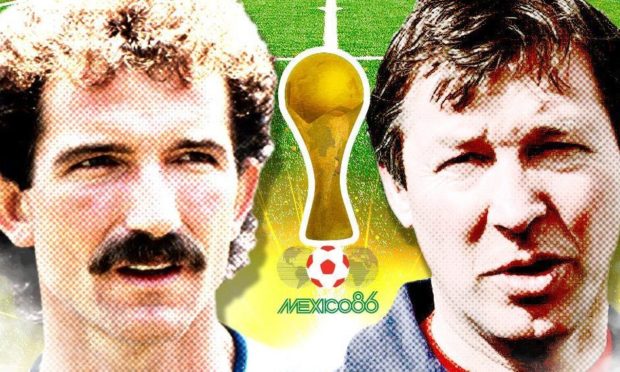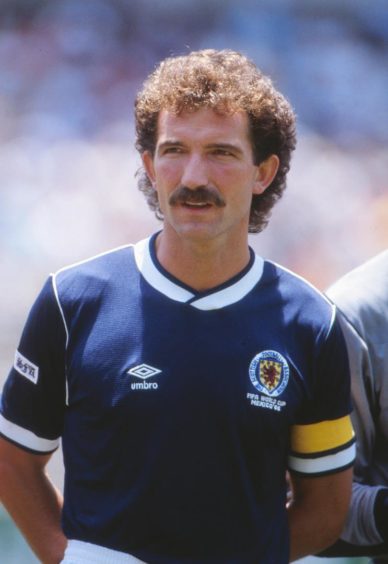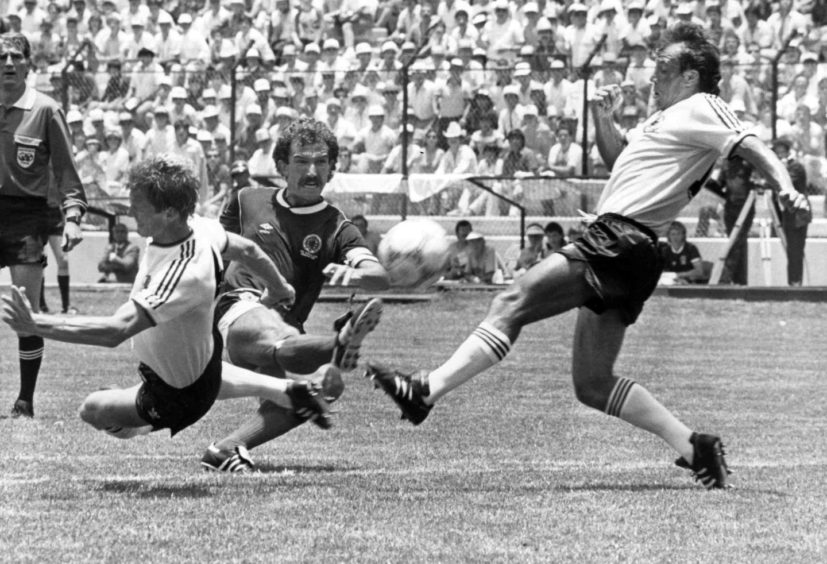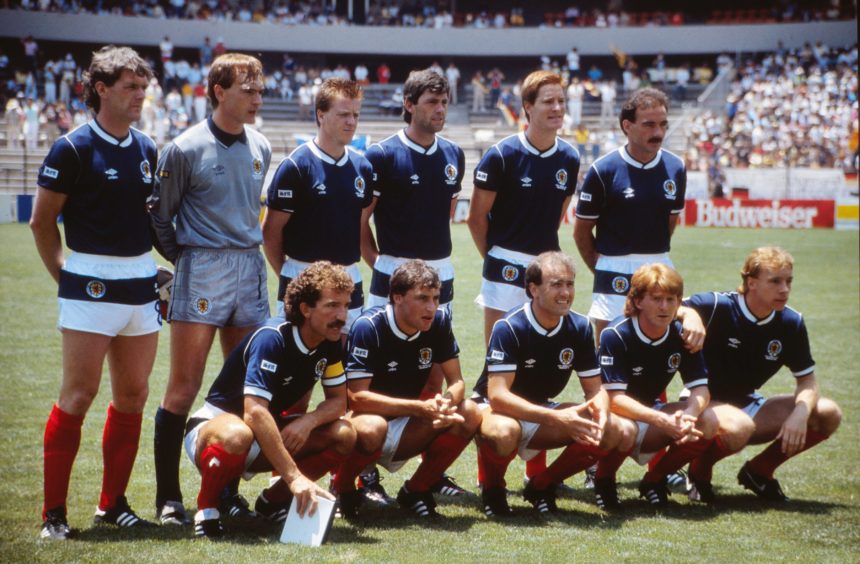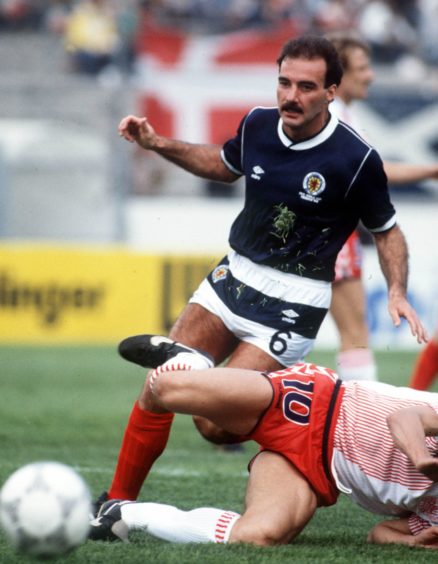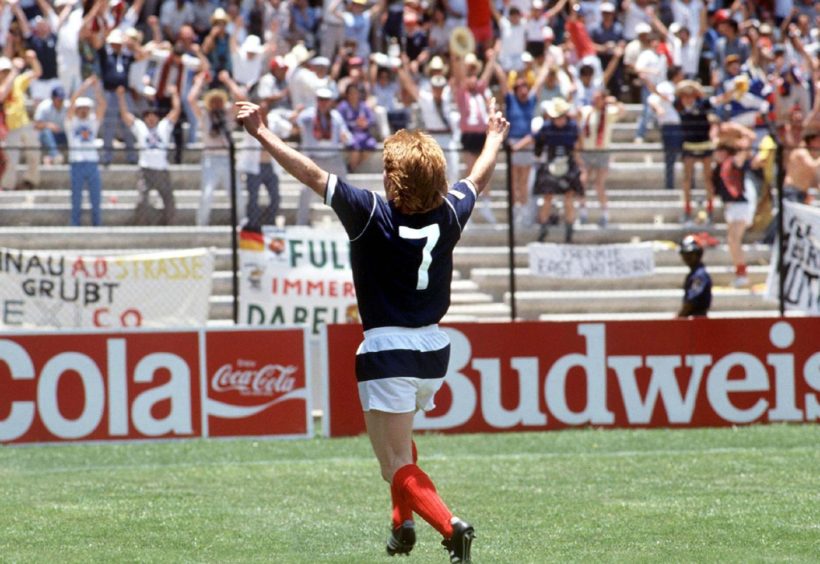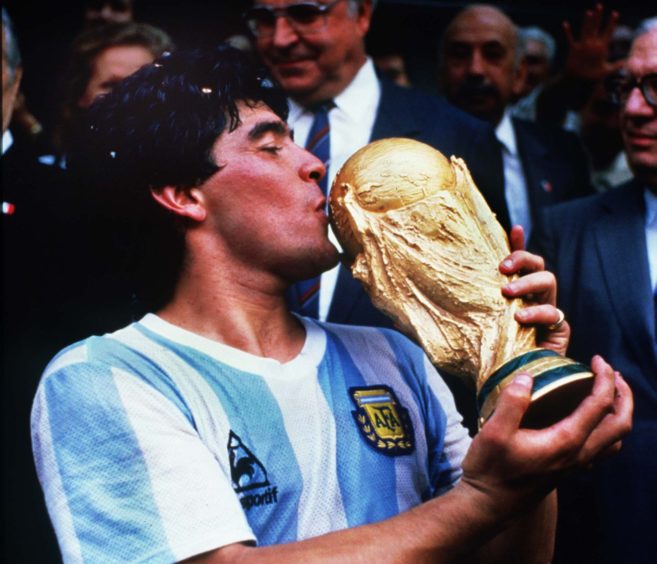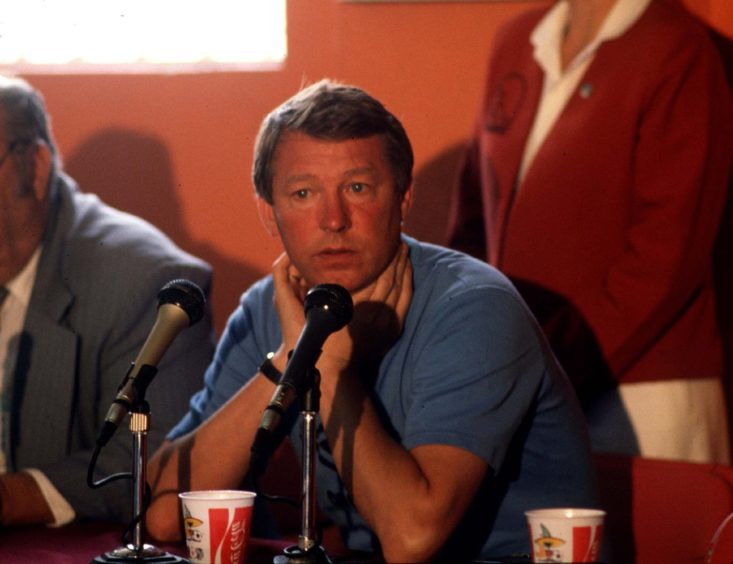It was the tournament where Scotland arrived and departed with barely a whimper: the 1986 World Cup in Mexico, which marked a bruising encounter between two of the giant figures in the game.
In the red corner was Alex Ferguson, the Aberdeen boss, who had steered the Pittodrie club to unprecedented success in the previous seven years, but who took charge of his country’s fortunes in unforeseen and tragic circumstances, following the sudden death of Jock Stein in Wales the previous autumn.
On the other side of the ring sat Graeme Souness, the talismanic, tough-tackling European Cup-winning Liverpool maestro, who made a cameo appearance in Alan Bleasdale’s hit 80s drama Boys from the Blackstuff, and was never afraid to turn a minor kerfuffle into a major stramash.
Neither character was renowned for turning the other cheek and, even as Fergie prepared to join Manchester United shortly after Souness hitched his wagon to Rangers, sparks flew during the Scots’ ill-fated campaign.
Alan Rough witnessed tensions in the camp
Alan Rough, who had been selected for his third successive World Cup, after the forays to Argentina and Spain in 1978 and 1982, was on the periphery of Ferguson’s squad, ranked behind Jim Leighton and Andy Goram.
By this stage of his career, he was in the veteran category at 34 and had no illusions about the faint prospect of actually getting on the pitch.
Indeed, even as his compatriots were putting in a lung-bursting effort in sweltering temperatures throughout their 2-1 defeat to West Germany in their second fixture, Rough and Graeme Sharp mingled with Tartan Army supporters, shared a few laughs, sipped a glass of juice and read a paper.
He never forgot the look on Souness’ face when the team marched out for the second half, already dripping in sweat after their previous exertions.
“Aye, it’s good to see that you fellows are really coping with the pressure,” said Souness, as witheringly and sarcastically as he could.
But, from Rough’s perspective, it was water off a duck’s back. As he declared: “It wasn’t our fault that we weren’t on the pitch, so we soon got back to our lemonade, our sports section and our sunbathing.”
There was nothing funny, though, about the arguments and bickering which regularly broke out between Souness and Ferguson.
Rough recalled: “At nearly every meeting the players held with Alex – and Graeme was head of the players’ committee, so there were plenty – they seemed to end up at each other’s throats or get embroiled in shouting matches, frequently over what seemed like trivial matters.
“I was baffled by these spats, but they kept happening and one of the most serious disagreements was sparked by what should have been a side issue: the number of overseas phone calls that the players were allowed to make.
“It might seem absurd that this should ever have been a contentious issue, but the SFA had decided that squad members should only be permitted – in the days before mobiles – one three-minute call twice a week.
“This was pretty pathetic for those with wives and young children, particularly when you think about the wads of cash in the governing body’s coffers.”
The contrast between the two was striking
Rough continued: “As soon as he heard the details, Graeme went ballistic, told us: ‘This is effing ridiculous’ and decided to fight our corner.
“Well, it developed into a really big argument between him and Alex, with the pair bawling at each other. And they just wouldn’t let up.
“I suppose they were a contrasting couple, but the team had been stuck in Mexico for nearly three weeks, and the niggles continued unabated between the two men. If it wasn’t one thing, it was something else.
“As to the phone issue, some of us could afford to ignore the SFA’s instructions because we had discovered we could use the BBC’s facilities by climbing through a window into one of their offices.
“As soon as that became public knowledge, we were on the blower for 45 minutes to our nearest and dearest and it was all done on the fly.
“Which, of course, just added to the amateurishness of the whole situation.”
It was the end of the line for Souness
Scotland failed to build up any momentum throughout the tournament and it was all strangely muted and downbeat with the emphasis on ‘beat’.
They had fancied their chances against Denmark in the opening game in Nezahualcoyotl – a venue to give commentators nightmares – but the Scandinavians secured a 1-0 victory through Preben Elkjaer-Larsen.
They improved significantly against the Germans and Gordon Strachan broke the deadlock in the 18th minute, but Rudi Voller levelled almost immediately and Klaus Allofs put in men in front early in the second period.
The format meant that they still had a chance of qualifying if they could defeat Uruguay in their final group tussle, but there was a sense of shock when Ferguson announced his line-up for the pivotal contest.
Souness, who had been skipper in the previous brace of games, was dropped and didn’t even feature among the names on the substitutes’ bench. His Scotland career – spanning 12 years, 54 caps and four goals – was over.
The Scots couldn’t beat 10 men when it mattered
There was the usual media speculation about the reasons behind Souness’ omission, but most of the reports skated around the subject. And there was little hint of the frisson which had built up between him and Ferguson.
Rough added: “The selection was unexpected, to say the least. The captaincy was passed to Willie Miller, while Paul McStay was introduced for the first time in the finals along with Arthur Albiston, Paul Sturrock and, to his immense surprise, Graeme Sharp.
“Some of these choices were, quite simply, baffling, and despite there being talk of dehydration having affected several of the players who had been involved against Germany, nobody had been forced to resort to the oxygen canisters which were stored in the dressing toom.
“Moreover, Souness was always one of the fittest members in the camp: he prided himself on his stamina and taking care of himself, so it was hard to avoid the suspicion that his omission was due to a personality clash.”
The same old story: what might have been
There was disgraceful behaviour from both the Uruguayan players and their supporters before and during the showdown. Several of their fans spat at the Scots from behind wire fences, while the team’s vicious tackling was condemned by everybody who witnessed it, not least when Jose Batista was red-carded in the very first minute for a horrible challenge on Strachan.
But – it’s a wearily familiar refrain – that doesn’t excuse the generally tepid display served up by the SFA’s finest with a numerical advantage for virtually the whole of the contest. And one man was conspicuous by his absence.
Rough said: “We should have been able to capitalise on it, but chances were thin on the ground and Uruguay just put up the shutters and killed the game.
“If ever the situation cried out for a rampaging maestro such as Souness to crank up the tempo and get the pulses racing, this was surely it.
“But, without him, the Scots simply wilted, our optimism faded and when Steve Nicol squandered our best chance, one of the other substitutes turned to me and said: “Geez, that was a lucky break’.
“I looked quizzically at him and he added: ‘Well, would it really be such a disaster if we don’t win this?’
“I could understand where he was coming from. In the cold light of day, we were never in with a shout of hoisting the World Cup and the winners of our tie with Uruguay were scheduled to meet [eventual winners] Argentina, Diego Maradona and the rest, in the next round.
“All we were doing was delaying the inevitable and that summed up what turned into a pretty lousy event for us. In fact, I’ve never fathomed why there was so little fuss from the supporters about 1986.
“We collected one paltry draw against 10 men and it was shrugged off with a ‘So what!’, whereas 1978 was viewed as a national disaster and we were ridiculed as laughing stocks who had shamed Scotland.
“Mind you, big Jock’s death had put football in perspective. I don’t think we had really recovered from the shock of it when we went to Mexico.”
The aftermath of the Mexican anti-climax
Within a few months of returning to Pittodrie, Ferguson was made an offer he couldn’t refuse and took over the reins at Manchester United.
Already a legend in north-east Scotland, his subsequent achievements were immense.
Souness, for his part, enjoyed considerable success at Rangers, albeit after being sent off on his debut against Hibs – who had Rough in goal – in a contest where the referee Mike Delaney dished out cards as if it was Christmas.
Both have been inducted into the Scottish Football Hall of Fame and are larger-than-life customers in their country’s sporting chronicles.
But there was definitely a cloud hanging over their tense Mexican stand-off.
At least the Scots were sailing with Rod Stewart
The Scots might have flopped in Mexico, but they were Top of the Pops in the build-up to the competition, especially when they were toasted by Rod Stewart while on a visit to Los Angeles.
Alan Rough was among the star-struck footballers who enjoyed a taste of the Hollywood high life after the rock legend turned up at the team hotel and requested permission from Ferguson to arrange a meal for the players.
He said: “Rod laid on a massive, chauffeur-driven limousine for half a dozen of us – Graeme Souness, Frank McAvennie, Mo Johnston, Steve Archibald, Graeme Sharp and myself – and, for a few hours at least, we were the Playboys of the Western World.
“We dined on oysters and champagne at a swanky restaurant on Sunset Boulevard where Rod, as usual, was more interested in talking about football than the rest of us. But we just couldn’t believe the luxury of the surroundings.
“It was a fabulous place – there was even a string quartet in the toilets playing Handel’s Water Music – and it was a wonderful experience.
“When we got back to our hotel, McAvennie told me there was a party in a room on the 15th floor. I rushed up the stairs and hammered on the door.
“It was eventually opened – by an irate Alex Ferguson, who asked me what the hell I thought I was doing.
“But that brought the curtain down on a night to remember.”
